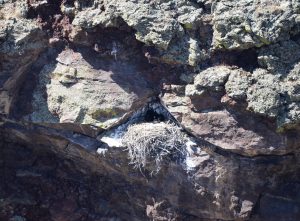“On behalf of the broader Babbitt Ranches Community, we are so thrilled to be a part of this wildlife success!”
“This is very exciting,” said Kenneth “Tuk” Jacobson, AZGFD raptor management coordinator. “Seeing that the pair produced two eaglets after a handful of measures were implemented to try to help them out is very gratifying.”
Through a unique conservation agreement with Babbitt Ranches, the State Land Department and AZGFD, a closure went into effect during the eagle nesting season from January through May. Special rules strictly banned target shooting, hunting, trapping and any other method of taking small game animals. Recreation such as hiking, hunting and riding UTVs was also off limits during the closure period. And, the use of lead bullets is forbidden.
“The extraordinary conservation framework that was put together to test in the SP Crater Golden Eagle Conservation Complex was designed to improve productivity, but there was no documentation, no direct observable proof available to show that this approach would work,” said Jacobson.
AZGFD research findings reveal that golden eagle pairs will abandon their eggs if they feel threatened. “Productivity rates are definitely low in Arizona. We are still crunching the numbers from last season, but there weren’t a lot of active, successful breeding areas this year because of factors such as the prolonged drought, rabbit hemorrhagic disease and limited prey resources,” said Jacobson.
In all of the breeding areas across Arizona that have been tracked by AZGFD, only about a quarter of them produced two eaglets. “Nine percent produced three, which is exceedingly rare,” he said.
Babbitt Ranches has been monitoring golden eagles across the 750,000-acre ranch for more than a decade and has been concerned about impacts on the nest at SP Crater. The eagle pair in that territory has produced only one eaglet in at least 10 years.
The SP Crater Golden Eagle Conservation Complex rules will remain in effect from January through May for at least the next two years, as researchers continue to monitor and study the raptors and their nesting success.
“On behalf of the broader Babbitt Ranches Community, we are so thrilled to be a part of this wildlife success!” said Billy Cordasco of Babbitt Ranches. QCBN
By Bonnie Stevens, QCBN







Leave a Reply